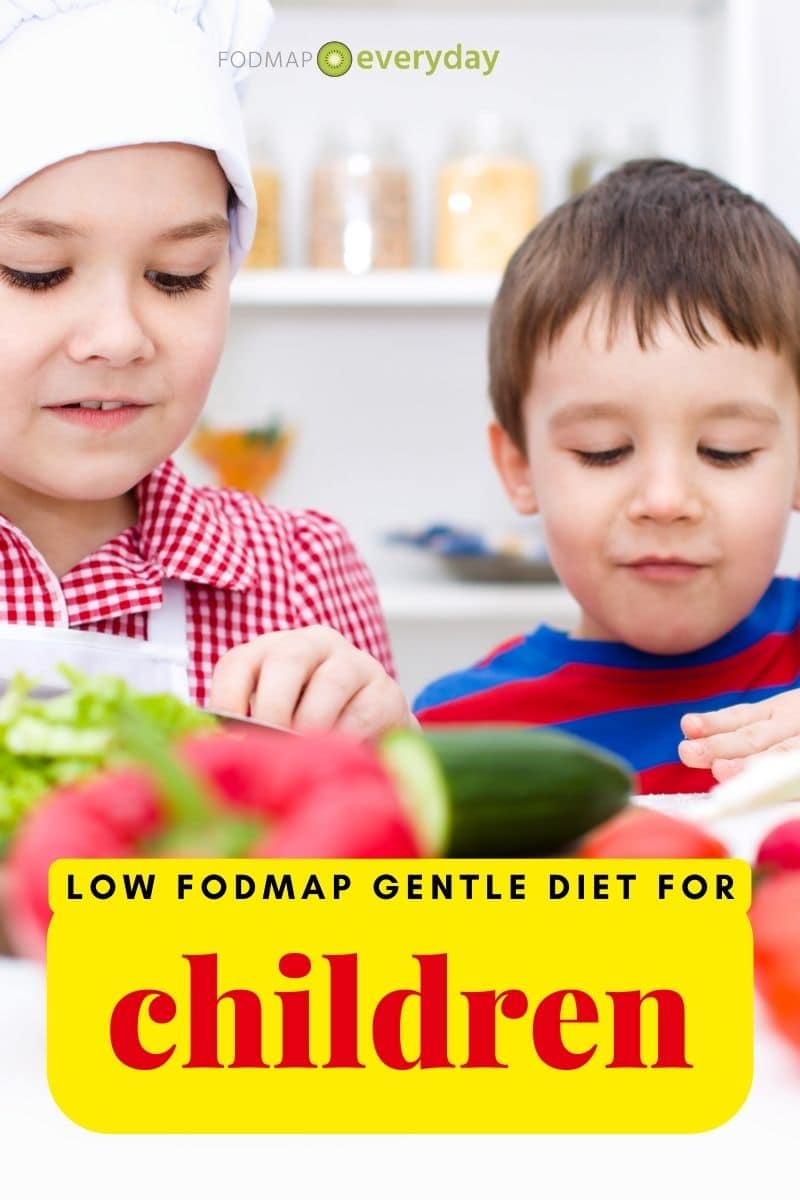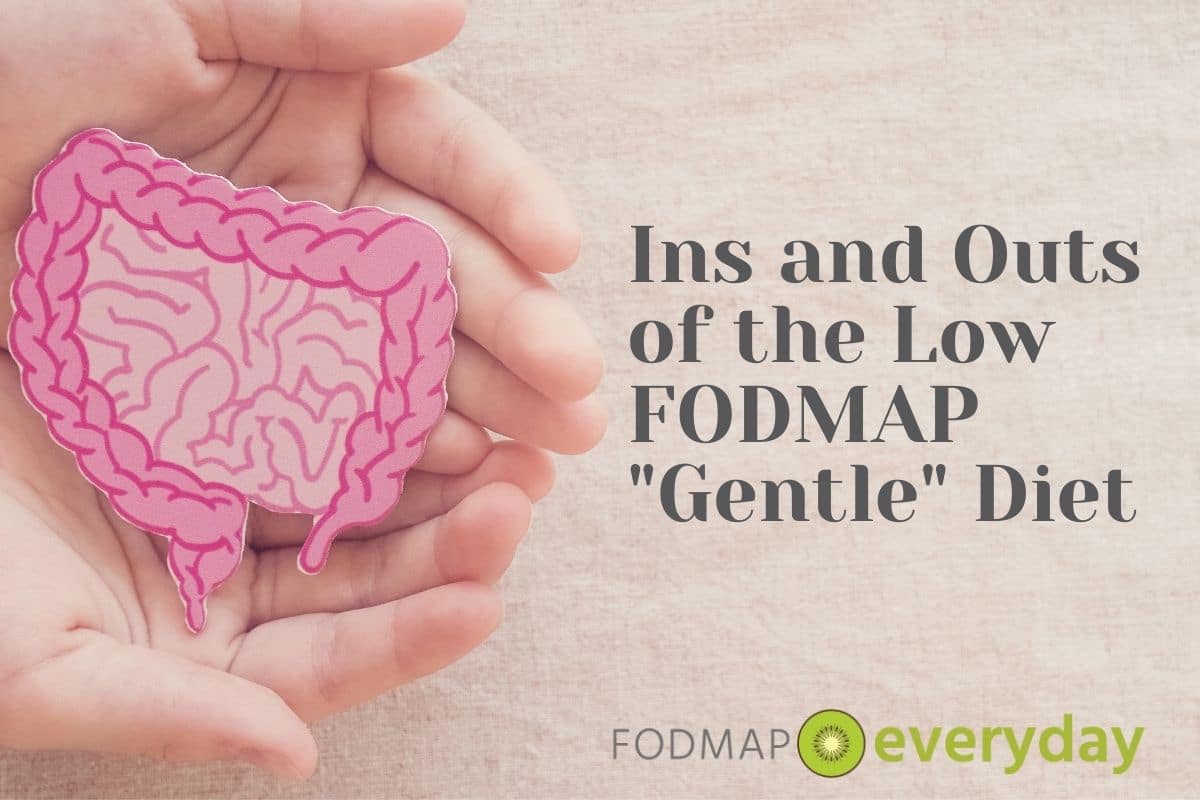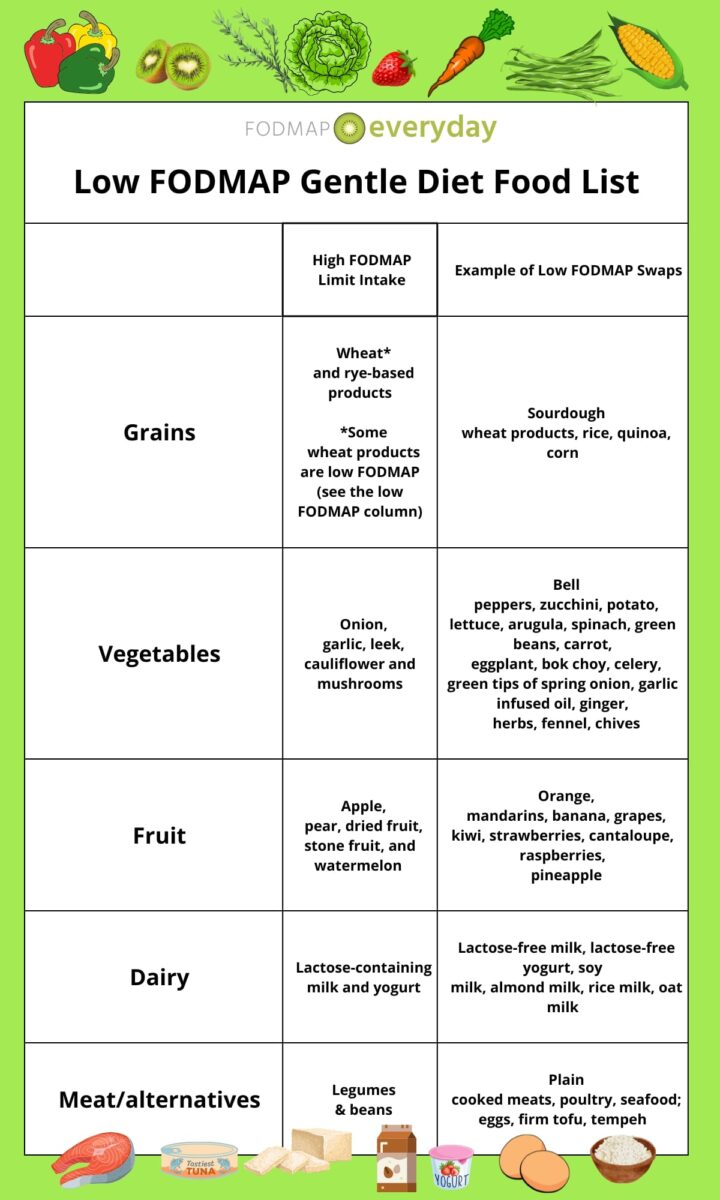DISCLAIMER: This article is for informational purposes only and is not designed to replace medical advice or individualized nutrition advice from a Registered Dietitian or medical doctor; always check with your/your child’s health care team for guidance.
This article will focus on the Low FODMAP Gentle Diet for caregivers with a child or teen with Irritable Bowel Syndrome (IBS). If you are an adult looking for a modified approach to your IBS management the Low FODMAP Gentle Diet approach may also work well for you, and we have an article geared towards that age group.
Other Articles You May Want To Read
- Ins and Outs of the Low FODMAP “Gentle” Diet
- The Microbiome Explained
- IBS in Children: What Do You Do?
- Elimination Diets and Children
- Should My Teen Go Low FODMAP
- How To Make The Low FODMAP Diet Work For You: From A Teen’s Perspective

- Can Children And Teens Experience IBS?
- How To Help Your Child
- Be sure to watch our video webinar with Julia Celestini RD, Pediatric Nutritionist:
- Get An Accurate Diagnosis From A Doctor
- The Low FODMAP Diet and The Low FODMAP Gentle Diet
- Is The Low FODMAP Diet Effective For Children?
- Let’s Look At The Low FODMAP Gentle Diet
- How Do You Follow The Low FODMAP Gentle Diet?
- Does The Low FODMAP Gentle Diet Really Work?
- Explaining The Low FODMAP Diet To Children
- Is The Low FODMAP Diet Necessary?
- The Takeaway
Can Children And Teens Experience IBS?
Absolutely! IBS is actually one of the most common disorders of gut-brain interaction (previously call functional gastrointestinal disorders) in children. Reports suggest that 2.8-5.1% of children in the United States have IBS, however other countries report even higher prevalence such as in 13.25% in China, 16% in Nigeria and even 22.6% in Turkey.
It is also possible the prevalence of IBS in children is even higher than reported because IBS overlaps with other conditions, which can be difficult to define in children (as with adults as well).
How To Help Your Child
How can you help your child or teen who is struggling with IBS?
We reviewed possible treatment options for children with IBS here, such as the traditional low FODMAP diet, medications, probiotics, peppermint oil, gut-directed hypnotherapy, cognitive behavioural therapy, to name a few.
Please note – when we refer to treatment options, we are referring to treating or managing IBS symptoms. These strategies are not cures for IBS but may help children find symptom relief.
Just like every child and teen has a unique personality, they also have unique physiology. What works for one child may not necessarily work for another child. I like to frame IBS treatment for kids like a toolbox that they create with their healthcare team; every child will find a different variety of tools that works for them -everyone’s toolbox looks different!
Be sure to watch our video webinar with Julia Celestini RD, Pediatric Nutritionist:
Get An Accurate Diagnosis From A Doctor
The first step is to understand which subgroup of IBS your child has: IBS with constipation (IBS-C); IBS with diarrhea (IBS-D); IBS with mixed bowel habits (IBS-M); or IBS with stool consistency that does not meet other criteria (IBS-U). This will help ensure your child receives tailored treatment options. Your child’s gastroenterologist or doctor can help you understand which type of IBS your child has, and you can work with them and a dietitian to decide which treatment options to try. If they are effective they can be added to your child’s “IBS toolbox”.
The Low FODMAP Diet and The Low FODMAP Gentle Diet
In this post, we are going to review the Low FODMAP Diet as well as the Low FODMAP Gentle Diet
If you have ever purchased a medication for your child, you might notice there is “pediatric dosing”. This is dosing based on age or might even be a special product specifically designed for kids. It is important that the same is applied when we consider any dietary approaches and interventions for children, such as the Low FODMAP Diet, or the Low FODMAP Gentle Diet.

Be sure to also read: Ins and Outs of the Low FODMAP “Gentle” Diet
Is The Low FODMAP Diet Effective For Children?
To date, there have only been a few studies looking at the low FODMAP diet in children with IBS. Two randomized control trials were performed with individuals ranging in age from 6-18 years, which showed statistically significant improvement in abdominal pain episodes, bloating and general well-being of the child who followed the low FODMAP diet.
From current studies we have available, all show promise in children for the low FODMAP diet to help children and teens with IBS. However, there are limitations and gaps in the existing literature which include:
- No standard protocol between studies
- Age-specific research is lacking (i.e., separating infants, toddlers, school aged children and adolescents/teens) – different developmental stages, different growth, and nutritional needs
- Long term impacts have not been assessment (i.e., potential impact on the maturing gut microbiome, risk of eating disorders/disordered eating, nutritional deficiencies, growth faltering)
- Long-term studies are needed to establish safety and efficacy
Matching Your Child To The Best Low FODMAP Diet Approach
It is important that we first take a step back and consider why a traditional “adult” approach to the low FODMAP diet might not be appropriate for every child or teen.
Note – every child and teen is unique; for some, following the traditional Low FODMAP Diet may be perfectly appropriate and work quite well. I just want to highlight here that the traditional approach may not work for every child or teen.

Let’s Look At The Low FODMAP Gentle Diet
Recently we discussed the Low FODMAP Gentle Diet as it pertains to adults. The Low FODMAP Gentle Diet is a “bottom-up” approach to the Low FODMAP Diet. With the Low FODMAP Gentle Diet you have a mild restriction of FODMAPs by limiting only very high FODMAP foods from your diet.
The Low FODMAP Gentle Diet approach is a great option:
- For children, teens, or older adults with IBS
- If you have other dietary restrictions (ex. food allergies)
- If you have another health condition that increases your risk of malnutrition (ex. Celiac disease)
- For those who find the standard low FODMAP diet overwhelming or too difficult
- If you want to protect your relationship with food by restricting the least amount of foods as possible
The Benefit Of The Low FODMAP Gentle Diet For Children & Teens
The benefits of a gentle approach for kids and teens are:
- Less restrictive and less overwhelming
- Prevents over-restricting foods
- Easier to follow
- Reduces risk of malnutrition
- Protects their relationship with food and may reduce food fears
- Supports nutritional adequacy
How Do You Follow The Low FODMAP Gentle Diet?
The Low FODMAP Gentle Diet is designed to eliminate very high FODMAP foods, where the standard Low FODMAP Diet limits foods with a wider variety of FODMAP amounts. However, the general concept and step-by-step approach is similar.
- Step one: Review the chart below to identify any high FODMAP foods that you currently consume.
- Next, think of swaps for these high fodmap foods, using the suggestions below or the Monash University app.
- When you are ready you can start the Elimination Phase – where you limit the very high FODMAP foods listed.
- After 2-6 weeks, reassess your symptoms. If you feel better and have better symptom control, you responded to the diet and can move onto the Challenge Phase.
- Challenge Phase: You can reintroduce the high FODMAP foods you limited in the Elimination Phase, one FODMAP group at a time.
- Try each new food for 1-3 days, starting with:
- Day 1: ⅓ of your usual portion
- Day 2: ½ your usual portion
- Day 3: your usual full portion.
- Only continue to try the food if your symptoms are non-existent or manageable.
- Assess how you feel and document your tolerance using the app.
If you want to print the below graphic out you can click on it and print the jpg version in color from your printer.
Does The Low FODMAP Gentle Diet Really Work?
Yes! (for some). Of course, everyone will have a different response to the Low FODMAP Gentle Diet approach. It is a very effective approach to IBS management that is similar to the Low FODMAP Diet. We do need more research on how individuals respond to the Low FODMAP Gentle Diet compared to a standard Low FODMAP Diet.
If you think about life before learning about FODMAPs you (or your child) were likely consuming large amounts of FODMAPs in every single meal (example – a large bowl of wheat pasta with garlic, onion, milk and mushrooms). Often a small reduction in FODMAPs can make a significant and effective difference to symptom relief. Simply put, this is the approach of the Low FODMAP Gentle Diet.
If your child or teen does not respond to a gentle approach initially, you can review with their dietitian if they can further customize their list or explore trying the traditional Low FODMAP Diet, which is more precise and restrictive.

Explaining The Low FODMAP Diet To Children
I highly encourage you to teach your child about their IBS diagnosis and FODMAPs and involve them as much as you can in this journey. It will help them feel empowered, feel more confident (and less embarrassed) about sharing their symptoms as well as learn to advocate for themselves as they get older (ex. sharing their diet restrictions with friends).
I love when children join my nutrition education sessions with parents and learn along the way. We can get very creative in adapting concepts for children and every family might choose to explain this differently. If you are stuck in trying to figure out how to explain something to your child, a great idea is to ask your child’s teacher for any ideas to help explain this concept based on their learning level.
Some examples of how to explain the low FODMAP diet:
- Young Children: We are removing some foods from your diet and trying different foods to see if it will help with your tummy pain. This will just be for a short while and then we will try adding foods back again.
- Older Children/Teens: We are going to try some foods swaps to help with your IBS symptoms. The swaps are to reduce the fermentable carbohydrates in your diet. Fermentable carbohydrates are a type of carbohydrate that the bacteria in your gut love. They eat and digest these carbohydrates (a process called fermentation) which causes gas, bloating and abdominal pain. After a few weeks of limiting the fermentable carbs will we try them again in an experiment. The end goal is to help you feel better, understand if any specific foods trigger your IBS symptoms, and help you eat as broadly as possible without triggering symptoms

Is The Low FODMAP Diet Necessary?
Does my child with IBS have to go on the low FODMAP diet (gentle or traditional) to manage their IBS symptoms?
The short answer: no!
It is always best to talk to your child’s doctor and Registered Dietitian (or equivalent in your country) before making any dietary changes. Although swapping high FODMAP foods for low FODMAP alternatives might seem benign and harmless, it is a big change, and any nutrition intervention comes with risks.
It is important to know that there are many other IBS management tools that can be explored aside from the low FODMAP diet. Some examples of these tools are gut-directed hypnotherapy, cognitive behavioural therapy, stress management strategies and medications, just to name a few!
Not all children and families are ready for a dietary change and dietary eliminations might not be suitable for all children and teens. If your family is interested in trying the gentle low FODMAP diet, it is important that your child and family are ready for these changes so the diet can be followed as closely as possible (with as minimal stress as possible) and so the changes are sustainable. It is possible for children and teens can find effective IBS symptom control without making diet changes.
The Takeaway
In summary, the Low FODMAP Gentle Diet can be a more appropriate and effective option for many kids and teens, compared to a standard FODMAP approach, however it is not for everyone (child, teen or adult).
Your best chance of success will be to work closely with your gastroenterologist and Registered Dietitian (or equivalent in your country). They will be able to tailor the approach that is best for your child.
And remember, the low FODMAP diet, traditional or gentle, is not a cure. The goal is to find an approach that minimizes or eliminates IBS symptoms, while developing and retaining a positive relationship with food, and also expanding the diet as much as possible for a healthy microbiome.
Other Articles You May Want To Read
- Ins and Outs of the Low FODMAP “Gentle” Diet
- The Microbiome Explained
- IBS in Children: What Do You Do?
- Elimination Diets and Children
- Should My Teen Go Low FODMAP
- How To Make The Low FODMAP Diet Work For You: From A Teen’s Perspective
If someone is looking for a pediatric GI, are there any organizations or websites that can be of help?
In Canada, families can ask for a referral to a pediatric GI directly. Having a pediatric GI is a great asset to your child’s medical team. Additionally, most hospitals have outpatient GI clinics depending on the child’s needs. Additional resources for general information for different gastrointestinal conditions I find recommend for families include:
- Canadian Celiac Association
- FPIES Foundation
- Canadian Digestive Health Foundation
- About Kids GI
- GI Kids
- About Kids Health
References
- Prevalence – Devanarayana, N. M., & Rajindrajith, S. (2018). Irritable bowel syndrome in children: Current knowledge, challenges and opportunities. World journal of gastroenterology, 24(21), 2211–2235. https://doi.org/10.3748/wjg.v24.i21.2211
- FODMAP Gentle – Halmos, E. P., & Gibson, P. R. (2019). Controversies and reality of the FODMAP diet for patients with irritable bowel syndrome. Journal of gastroenterology and hepatology, 34(7), 1134–1142. https://doi.org/10.1111/jgh.14650
- Dogan, G., Yavuz, S., Aslantas, H., Ozyurt, B. C., & Kasirga, E. (2020). Is low FODMAP diet effective in children with irritable bowel syndrome? Northern clinics of Istanbul, 7(5), 433–437. https://doi.org/10.14744/nci.2020.40326








